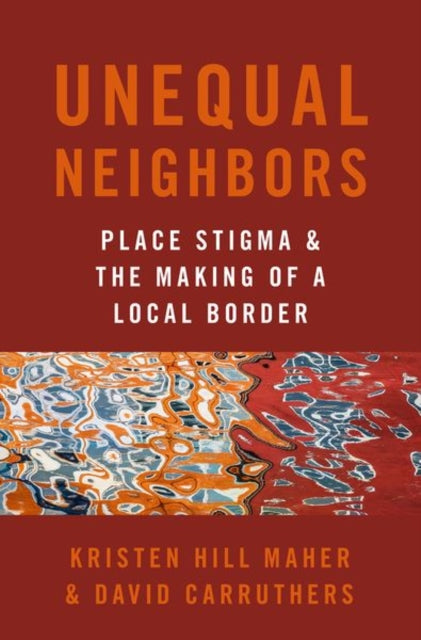Kristen HillMaher,DavidCarruthers
Unequal Neighbors: Place Stigma and the Making of a Local Border
Unequal Neighbors: Place Stigma and the Making of a Local Border
YOU SAVE £0.48
- Condition: Brand new
- UK Delivery times: Usually arrives within 2 - 3 working days
- UK Shipping: Fee starts at £2.39. Subject to product weight & dimension
Bulk ordering. Want 15 or more copies? Get a personalised quote and bigger discounts. Learn more about bulk orders.
Couldn't load pickup availability
- More about Unequal Neighbors: Place Stigma and the Making of a Local Border
San Diego and Tijuana are neighboring cities with deeply intertwined histories, cultures, and economies, but they are also the site of a national border enforcement spectacle. In Unequal Neighbors, Kristen Hill Maher and David Carruthers examine the role of place stigma in reinforcing actual and imagined inequalities between these cities. They argue that widespread bordered imaginaries in San Diego represent it as a place of economic vitality, safety, and order, while stigmatizing Tijuana as a zone of poverty, crime, and corruption. The book explores how asymmetries between these cities have been produced and reinforced through stigmatizing representations of Tijuana in media, everyday talk, economic relations, and local tourism discourse and practices, but also examines debordering practices and counter-narratives about Tijuana's image.
\n Format: Paperback / softback
\n Length: 368 pages
\n Publication date: 24 September 2021
\n Publisher: Oxford University Press Inc
\n
San Diego and Tijuana, two neighboring cities situated on the national border, have a complex history, culture, and economy that is intertwined in many ways. However, their relationship is often portrayed as a spectacle of national border enforcement, overshadowing the deeper connections between these cities. In their book "Unequal Neighbors," Kristen Hill Maher and David Carruthers shift the focus from the national border to a local one, examining the role of place stigma in reinforcing actual and imagined inequalities between San Diego and Tijuana.
Widespread bordered imaginaries in San Diego depict it as a place of economic vitality, safety, and order, while stigmatizing Tijuana as a zone of poverty, crime, and corruption. These dualisms misrepresent the complex realities on the ground, but they also have real material effects. The vision of a local border benefits some actors in the region while undermining others.
The book "Unequal Neighbors" is based on a wide range of original empirical materials and examines how asymmetries between these cities have been produced and reinforced through stigmatizing representations of Tijuana in media, everyday talk, economic relations, and local tourism discourse and practices. The authors argue that place stigma operates as a powerful tool for maintaining social and economic inequalities, as it creates boundaries between communities and reinforces existing power structures.
However, the book also highlights that place stigma and borders are not fixed entities and are subject to contestation. The authors examine debordering practices and counter-narratives about Tijuana's image, demonstrating how these practices can challenge and transform stigmatizing representations. They argue that by recognizing and challenging place stigma, we can create more inclusive and equitable communities that are better equipped to address the challenges of inequality.
While the book focuses on the specific context of the Tijuana border, the processes it documents offer a window into the making of unequal neighbors more broadly. The dynamics at the Tijuana border provide a framework for understanding how inequalities that manifest in cultural practices produce asymmetric borders between places. The book highlights the importance of recognizing and challenging place stigma, as well as the potential for creating more inclusive and equitable communities through debordering practices and counter-narratives.
In conclusion, "Unequal Neighbors" is a valuable contribution to the study of place stigma and its implications for inequality. By examining the role of place stigma in reinforcing actual and imagined inequalities between San Diego and Tijuana, the book offers a nuanced understanding of the complex dynamics at play in these cities. The book's insights into the processes of place stigma and debordering practices provide valuable lessons for policymakers, community organizers, and individuals who are interested in creating more inclusive and equitable communities.
\n Weight: 534g\n
Dimension: 234 x 155 x 22 (mm)\n
ISBN-13: 9780197557204\n \n
This item can be found in:
UK and International shipping information
UK and International shipping information
UK Delivery and returns information:
- Delivery within 2 - 3 days when ordering in the UK.
- Shipping fee for UK customers from £2.39. Fully tracked shipping service available.
- Returns policy: Return within 30 days of receipt for full refund.
International deliveries:
Shulph Ink now ships to Australia, Belgium, Canada, France, Germany, Ireland, Italy, India, Luxembourg Saudi Arabia, Singapore, Spain, Netherlands, New Zealand, United Arab Emirates, United States of America.
- Delivery times: within 5 - 10 days for international orders.
- Shipping fee: charges vary for overseas orders. Only tracked services are available for most international orders. Some countries have untracked shipping options.
- Customs charges: If ordering to addresses outside the United Kingdom, you may or may not incur additional customs and duties fees during local delivery.


